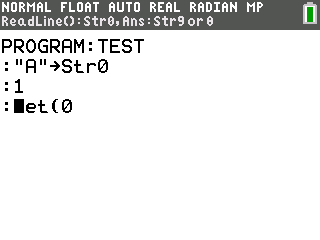General Syntax
Overview
Celtic uses a parser hook to search for a token in your program and run its ASM code if it finds it.
When it encounters the det( token, Celtic will detect which function you are calling and any arguments with it.
The first argument after the det( token tells Celtic which function you wish to call.
If you have entered a valid argument, Celtic will tell you what function the argument is referencing in the status bar of the program editor when your cursor is over it.

Celtic’s function preview feature.
The function preview follows a general syntax: “CommandName(Arguments): Input Vars (if any): Output Vars (if any)”. As you can see in the example above, ReadLine is listed with no arguments, Str0 and Ans as the input variables, and Str9 or theta as the output variables. If no input variables are necessary (though there are still output variables), it will say “NA” instead. Nothing will be listed if there are no input and output variables.
Note
In the event that you pass invalid arguments to Celtic, it will return an error. All errors are returned in Str9. See the Error Codes page for more information.
Check if Celtic is Installed
If your program uses Celtic, it is recommended that it makes sure Celtic is installed when ran. To check if Celtic is installed, it is recommended you put something like this at the beginning of your program:
::DCS
:"Icon data...
:If 90>det([[20
:Then
:Disp "Get Celtic CE to run this:","bit.ly/CelticCE
:Return
:End
det([[20]]) will equal 90 if Celtic CE is installed. If the program aims to be compatible with Celtic 2 CSE, you may wish to refer to the list of version codes on the DCS Wiki as well.
prgmAINSTALL
You’ll notice that along with the CelticCE installer binary, Celtic also comes with a program called AINSTALL. This program can be used to install CelticCE’s hooks (The part of the installation done after the app has been installed) by running it instead of needing to open the app. Like the AINSTALL program in Celtic III, this can be used if you wish to install CelticCE from a TI-BASIC program, by simply running prgmAINSTALL in it. Keep in mind that prgmAINSTALL will only work if the CelticCE app is present and installed on your calculator.
Argument Types
Arguments are passed to Celtic in three different ways. They can be passed in the det( function, in the Ans variable, or in a string.
The method of passing arguments will differ, depending on the function and the type of argument that is being passed.
The specific syntax for each function is listed in the documentation.
Most often, numerical arguments are passed in the det( function. Variable names are put in Str0, and strings arguments are put in Str9. The exact usage will vary depending on the function.
Celtic only accepts positive real integers as arguments. If a decimal number is passed, Celtic will only take the integer part of it.
When using Str0 as a program name, simply store the name of the program into Str0. When storing an AppVar, begin the string with the rowSwap( token. When storing a group, begin the string with the *row( For example:
:"FOO" -> Str0 //program FOO
:"rowSwap(FOO" -> Str0 //AppVar FOO
:"*row(FOO" -> //group FOO
The system programs prgm# and prgm! are not supported, so if you attempt to use a Celtic command on them, the command will simply exit.
If a string is used, it must be in the RAM when the function is called.
Returns
Depending on the function, Celtic will return a value after it runs. For example, the SpecialChars command fills Str9 with certain special characters.
String returns (including errors) are most often in Str9, while numerical returns are in the Theta variable. Almost all functions will return the initial contents of Ans (in order to preserve it).